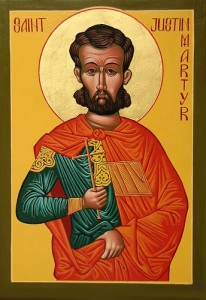 From the name of this website you might guess that the term apologetics comes from the Greek apologia meaning “defense.” Why is defense necessary? Today Christianity is slandered by the likes of Richard Dawkins, Christopher Hitchens and Sam Harris as irrational and even dangerous. Yet, it’s nothing new. As defenders of the faith, the second century apologists were responding to charges of incest, cannibalism, atheism, and being a subversive group.[1] Like today, these charges were all representative of the gross misunderstandings of Christian traditions which circulated the pagan world: communion was cannibalism, atheism for denying the Roman pantheon, incest from innocent love feasts and calling one another “brothers and sisters in Christ” and subversive for not worshipping the emperor. The early apologists answered these ill-informed charges against Christians, appealed to evidence and reason and argued for tolerance. Justin Martyr is considered a good representation of a second century apologist and his First Apology is discussed below.
From the name of this website you might guess that the term apologetics comes from the Greek apologia meaning “defense.” Why is defense necessary? Today Christianity is slandered by the likes of Richard Dawkins, Christopher Hitchens and Sam Harris as irrational and even dangerous. Yet, it’s nothing new. As defenders of the faith, the second century apologists were responding to charges of incest, cannibalism, atheism, and being a subversive group.[1] Like today, these charges were all representative of the gross misunderstandings of Christian traditions which circulated the pagan world: communion was cannibalism, atheism for denying the Roman pantheon, incest from innocent love feasts and calling one another “brothers and sisters in Christ” and subversive for not worshipping the emperor. The early apologists answered these ill-informed charges against Christians, appealed to evidence and reason and argued for tolerance. Justin Martyr is considered a good representation of a second century apologist and his First Apology is discussed below.
He first addresses in chapter 4 that Christians were being judged by the mere application of the name “Christian.” He makes an analogy with the term “philosopher” by appealing to the diversity of thought under that moniker. Similarly, not all who are labeled Christian follow Christ. He argues that people should be judged by their actions rather than a label. Next he addresses the charge of atheism. In chapter five, he does not deny the existence of the entities known as the pagan gods but he identifies them as demons. While this might seem an unusual track to some, it is coherent with the New Testament thought of Paul (1 Cor 10:20). This is an area most modern apologists shy away from. While caution is in order, we should not balk like skeptics do. The Bible presents a demon haunted world and approximately one-fourth of all the healings recorded in the Gospel of Mark were actually deliverances. The woman whom Jesus healed in Luke 13:11-12 had been the victim of a “disabling spirit” for 18 years. We should be wary of being held captive by the naturalism of our age (Col 2:8).
Justin argues Christians are not really atheists because they believe in the true God albeit denying the demonic pretenders. Justin is well versed in the scriptures and philosophy and makes ample use of analogy. He even appeals to Socrates as a voice of reason and then to Jesus as the incarnate logos or “Reason Himself.” Ferguson explains the linking of Hebrew and Greek thought in the Logos doctrine as the, “…systematic linking of the Messiah with both Greek preexistent logos and Jewish preexistent Word, Wisdom, or Spirit.” (cf. Jn 1:1; Pr 8:22) [2]
He explains the nature of Christianity and the Kingdom hoped for. He explains that Christians are model citizens promoting peace because they live to please God who sees all things. He offers the high ethical teachings of Jesus and the instructions to pay taxes. In chapters 19-23, he argues from analogies the reasonableness of Christian beliefs in resurrection, creation and afterlife. He mentions Simon the magician from Acts 8:9ff who had become a gnostic hero. (I am currently working on some in depth research into Justin and Irenaeus’ account of Simon.) In chapters 30-36, he distinguishes Jesus from magicians with his “strongest and truest evidence” in the form of the prophecies concerning him.[3]
Justin then argues from messianic prophecy from Moses, Isaiah, Micah and others. He argues the prophets were divinely inspired. He argues that prophecy does not entail determinism and that men are responsible for their actions. He argues that pagan mythology is a demonic imitation of prophecy. Justin even uses Plato to build a bridge to the Gospel. The argument from prophecy is not used much today and when it is it is often mishandled so it appears circular. It is one subject that I intend to pursue with some scholarship as I believe it has much force in demonstrating the supernatural origin of scripture when handled properly. Also, predictive prophecy was God’s chosen method of authentication (Is 46:8-10).
Justin was a scholar and he knew the scriptures well. He also knew the literature of his day. It is important that apologists today have a well-rounded education. Modern apologists can learn from the manner Justin skillfully navigates the pagan world and seeks to build bridges to the Gospel. Paramount is his argument from Christian character. We should live distinctive lives in pursuit of holiness and defend the faith with gentleness and respect (1 Pet 3:15).
[1] Everett Ferguson, Church History Volume One: From Christ to Pre-Reformation: The Rise and Growth of the Church in Its Cultural, Intellectual, and Political Context, Kindle ed.(Grand Rapids: Zondervan, 2009) Kindle Location 1430.
[2] Ferguson, Church History, Kindle Locations 1484-1485.
[3]Justin Martyr, The First Apology, 30.



